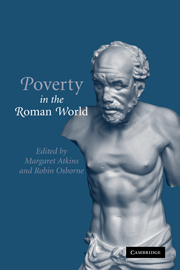Book contents
- Frontmatter
- Contents
- List of contributors
- Preface
- List of abbreviations
- Chapter 1 Introduction: Roman poverty in context
- Chapter 2 The poor in the city of Rome
- Chapter 3 Stratification, deprivation and quality of life
- Chapter 4 ‘You do him no service’: an exploration of pagan almsgiving
- Chapter 5 Writing poverty in Rome
- Chapter 6 Poverty and population in Roman Egypt
- Chapter 7 A pragmatic approach to poverty and riches: Ambrosiaster's quaestio 124
- Chapter 8 Portraying the poor: descriptions of poverty in Christian texts from the late Roman empire
- Chapter 9 Throwing parties for the poor: poverty and splendour in the late antique church
- Chapter 10 Salvian, the ideal Christian community and the fate of the poor in fifth-century Gaul
- Chapter 11 Poverty and Roman law
- Bibliography
- Index
Chapter 2 - The poor in the city of Rome
Published online by Cambridge University Press: 22 September 2009
- Frontmatter
- Contents
- List of contributors
- Preface
- List of abbreviations
- Chapter 1 Introduction: Roman poverty in context
- Chapter 2 The poor in the city of Rome
- Chapter 3 Stratification, deprivation and quality of life
- Chapter 4 ‘You do him no service’: an exploration of pagan almsgiving
- Chapter 5 Writing poverty in Rome
- Chapter 6 Poverty and population in Roman Egypt
- Chapter 7 A pragmatic approach to poverty and riches: Ambrosiaster's quaestio 124
- Chapter 8 Portraying the poor: descriptions of poverty in Christian texts from the late Roman empire
- Chapter 9 Throwing parties for the poor: poverty and splendour in the late antique church
- Chapter 10 Salvian, the ideal Christian community and the fate of the poor in fifth-century Gaul
- Chapter 11 Poverty and Roman law
- Bibliography
- Index
Summary
THE POLITICS OF ROMAN POVERTY
Almsgiving, though it cannot be stopped at present, as without it we should have hunger riots, and possibly revolution, is an evil. At present we give the unemployed a dole to support them, not for love of them, but because if we left them to starve they would begin by breaking our windows and end by looting our shops and burning our houses … In ancient Rome the unemployed demanded not only bread to feed them but gladiatorial shows to keep them amused; and the result was that Rome became crowded with playboys who would not work at all, and were fed and amused with money taken from the provinces. That was the beginning of the end for ancient Rome. We may come to bread and football (or prizefights) yet.
(George Bernard Shaw,The Intelligent Woman's Guide to Socialism, Capitalism, Sovietism and Fascism (1928))In the late eighteenth and early nineteenth centuries, writers on political economy frequently turned to examples from classical history, and above all from the history of Rome, to illustrate and support their arguments. Rome was better documented than any other past society, and the broad outlines of its history were familiar to educated people; more importantly, it was felt to be sufficiently similar to the present – a complex, ‘civilised’ society, and the ancestor of European civilisation – to make comparisons meaningful and productive.
- Type
- Chapter
- Information
- Poverty in the Roman World , pp. 21 - 39Publisher: Cambridge University PressPrint publication year: 2006
- 81
- Cited by



